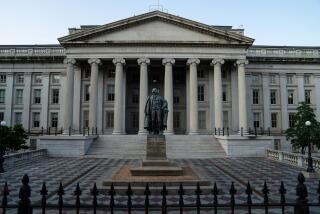Pension Agency’s Deficit Soars
The U.S. agency that provides a safety net to company pension plans will announce a $10-billion deficit this week, a congressman said Tuesday, warning that it raised the prospect of a taxpayer bailout.
It would be a record deficit for the Pension Benefit Guaranty Corp., which a year ago reported its worst year ever and has seen its deficit grow since then.
The agency said in October that it had a record $8.8-billion deficit as of August, up from a fiscal 2002 deficit of $3.64 billion and a $7.73-billion surplus the previous year.
The agency had no comment on the statement by California Rep. George Miller (D-Martinez), the ranking Democrat on the House Education and Workforce Committee and a longtime critic of Republican pension policy.
The PBGC is expected to announce its financial condition Thursday. “We won’t have any comment until then,” said spokesman Jeffrey Speicher.
The agency’s executive director, Steven Kandarian, repeated his warning last week that U.S. taxpayers might be called on to bail out the agency. Kandarian said last week that he would be leaving the agency in mid-February for family reasons.
The $10-billion deficit was in the PBGC’s single-employer insurance program, Miller said. He added that for the first time in history, the PBGC was reporting that its coverage for the nation’s multi-employer pension plans also was running a deficit estimated to be in the millions of dollars.
The PBGC was established in 1974 to protect traditional, or “defined benefit” pension plans, which promise workers a specific payout based on salary and years of service. It insures the plans of about 44 million Americans.
Businesses pay insurance premiums to the PBGC and the agency shoulders the burdens of insolvent retirement plans.
A year ago Kandarian said that losses from collapsing steelmakers had driven the agency into a record deficit. But lower stock prices and lower interest rates have put the squeeze on all defined-benefit plans, creating a shortfall that the government last year estimated at $350 billion.
When the Senate returns later this month, it is expected to take up a House-passed bill that would grant $25.5 billion in temporary relief across the board to companies struggling to fund traditional pension plans, while searching for a longer-term reform of pension funding.
The Bush administration has endorsed this approach but criticized proposals to add extra help for some companies, such as the airlines, with severely underfunded plans.
More to Read
Inside the business of entertainment
The Wide Shot brings you news, analysis and insights on everything from streaming wars to production — and what it all means for the future.
You may occasionally receive promotional content from the Los Angeles Times.










